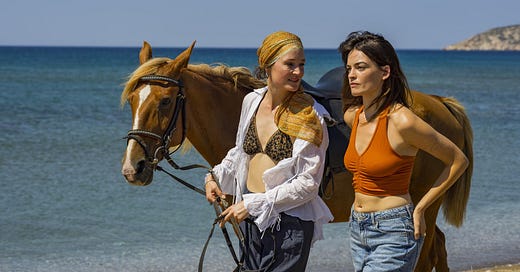Hot Milk
This meandering drama can't decide if it's about a strained mother-daughter relationship or a sweltering romance with a mercurial stranger.
“Hot Milk” is one of those movies that tries to get by on mood and enigmatic moments, but doesn’t really have a very good sense of what it’s trying to do.
It stars Emma Mackey, a British up-and-comer whose work I’ve really liked on the Netflix show “Sex Education” and a growing filmography (“Death on the Nile”). She plays Sophia, a wandering young woman who’s suspended her studies to take care of her nettlesome mother, played by Fiona Shaw, with a mysterious ailment — possibly psychosomatic — that renders her unable to walk (mostly).
They arrive in Spain to seek help from a specialist, who happens to work in one of those gorgeous seaside towns where all anybody seems to do is hang out on the beach, dance and eat. There she meets Ingrid, an enigmatic German woman (Vicky Krieps). The begin a sweltering romance, almost without any input on Sophia’s part, and she’s both thrilled by this new adventure and vexed by the way the mercurial Ingrid treats her as a summer plaything.
Based on the novel by Deborah Levy, it’s written and directed by Rebecca Lenkiewicz, a veteran screenwriter with some impressive credits to her name including “Ida,” “Disobediance” and “She Said.” It’s her first stint in the director’s chair, and it feels like the filmmaker doesn’t have a firm grasp of the movie’s themes, and tries to cheat by layering in pensive pauses and dream-like encounters.
Sophia first encounters Ingrid while dozing on the beach as she rides up in a very heroic pose on a horse — though possibly this is a half-dreamt memory of the tantalizing possibilities she represents. Later they meet again at a beachside cafe, and after bumming a cigarette Ingrid simply announces, “OK, let’s go” … and Sophia follows.
Ingrid owns a dress shop in town that she occasionally keeps open, and always seems to wear a brightly covered scarf over her hair. She seduces Sophia with an almost insistently carefree way, like everyone around her must adopt her attitudes. She also has an erstwhile boyfriend, Mattie (Yann Gael), and doesn’t think there’s anything wrong with sleeping with Sophia and then greeting Mattie with a passionate kiss.
Later, we’ll meet other guys like this, and it becomes clear Sophia is simply another background player in the ongoing production where Ingrid always occupies center stage.
I suppose there’s some similarity in the way Sophia is lightly regarded by Ingrid in her own relationship with her mother, Rose (Shaw). The older woman is an inconsolable bundle of nerves, constantly making demands on Sophia while keeping up a steady stream of low-grade belittling.
For example, she frets about her daughter putting her college work in anthropology on hold, chastising her for never finishing anything she starts, when of course it’s her invalidism that’s intruding on Sophia’s ability to carry on her own path.
Dr. Gomez (Vincent Perez), the psychiatrist Rose has come to Spain to see — mortgaging her house to pay for it, something Rose will continually remind everyone about — asks a lot of probing questions about Rose’s background, especially her family. A sister who died when Rose was young seems the key to many locked secrets. Sophia will get some questioning of her own, and it seems she’s internalized her mother’s stuntedness herself.
Most vexing is that Rose will actually walk from time to time. She claims not to understand why this is possible, as otherwise crippling pain in her legs keeps her confined to a wheelchair. She’s constantly asking for water, harping on Sophia, whose patience begins to wear thin, thus leading to more time spent away with Ingrid.
And… that’s the movie. Nothing else really much “happens,” though pictures like this are less dependent on the turning of the plot than measuring the emotional promenade of its characters. Trouble is, none of the three women seem very accessible to the audience.
Mackey makes for a compelling presence, even if Sophia is not given much to do but react to the more demonstrative Ingrid and Rose. We can feel her sulking at being trapped someplace where she wants to do, reaching out to Ingrid as a way of expressing her own agency, and then seeing that thrown back in her face with Ingrid’s casual dismissiveness.
Shaw gets some fine moments as Rose, showing us her stubbornly clinging to her image as a perpetual victim. Despite sitting nearly all the time, she seems ready to spring out of her seat, her shoulder and neck muscles tensing like a frustrated panther.
Krieps isn’t particularly likeable as Ingrid, but she’s not meant to be. We’ll learn a little more about her background, including some troubles that strangely parallel Rose’s. It seems clear that Ingrid’s solution to trauma is to run from and ignore it, and it’s resulted in a woman who is romantically a renter, not a buyer.
Early on, Sophia gets stung by a jellyfish while swimming at the beach, seeks aid from a lifeguard, and wears the scar on her arm like a delicate tattoo commemorating the experience. It’s something superficial, standing in for deeper wounds we can’t see.
If “Hot Milk” has something to say, it’s garbled and confusing — like being underwater when someone above is talking to you. Despite some lovely vignettes, the message gets drowned out in a cacophony of idle moments.





